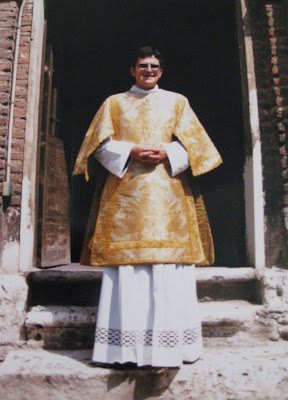
During the past fortnight I gave a series of two talks to a group in Sydney on the legacy of Pope John Paul II. The first talk was an overview of his pontificate, and the second an overview of his thirteen Encyclicals. While preparing for the talks I was moved by the sense that, at the time that John Paul II had been giving the most extraordinary message of life and salvation to a bewildered world, I at that time was not amongst those who were hearing this message, but remember all sorts of very poltry considerations which I had been concerned with during many of those years.
The group I was addressing in Sydney these past two weeks numbered about sixty people and many of them confessed to me afterwards that they too had never really heard John Paul II's teaching - a teaching which was delivered in the most public, clear and straightforward way, across the globe, during a Pontificate which lasted twenty six years.
Now, there will be many reasons why Catholics have not yet heard the message that John Paul II gave us, some admissible, others very concerning. However, it is also the case that the world, in large part, either has not heard his message, or hearing it, did not heed it. States, nations, societies and cultures, are caught up today in the spell of secularism.
Our cultures today have emerged from that short era of rebuilding which engaged most of the world after the unimaginable devastation of two world wars. During, and immediately after, the second war, there was a hope that the West would have been rebuilt upon the foundation of the Gospel. But, as we are all now aware, once the 1950s was underway the movement of secularism was embraced with great eagerness. That movement is now in such full speight that the clarity and illumination of John Paul II's teaching, which makes available such a transforming power for individuals, communities, nations and the whole planet, appears now like a tiny glowing ember on an ice-flow.
Well, now is not the time to 'drop the ball'. It may be the case that the mass media is in the hands of a tiny but dangerous minority who skillfully direct, from hidden boardrooms, the various currents of secularism; that politicians, many of whom are self-styled atheists, find themselves on the front faces of unstable glaciers; that Market forces, having been unleashed, are now unworthy mentors, but the day is young. Yes, it may also be the case that many have never picked up this ball, but the legacy of John Paul II is very much with us. So, we should pick it up, run with it and hand it on. If you have never enquired into his teaching, then enquire. If you have heard or read some of it, read it again. Open it up, break into it, break it down and make it more and more accesible. Apply it. Teach it. Witness to it. John Paul II was immensely powerful in life; his power is greater now. Turn to him, enquire of him and ask for his intercession:
O holy Trinity, we thank you for having given to the Church Pope John Paul II, and for having made him shine with your fatherly tenderness, the glory of the Cross of Christ and the splendor of the Spirit of love. He, trusting completely in your infinite mercy and in the maternal intercession of Mary, has show himself in the likeness of Jesus the Good Shepherd, and has pointed out to us holiness as the path to reach eternal communion with you. Grant us, through his intercession, according to your will, the grace that we implore, in the hope that he will soon be numbered among your saints. Amen.






















